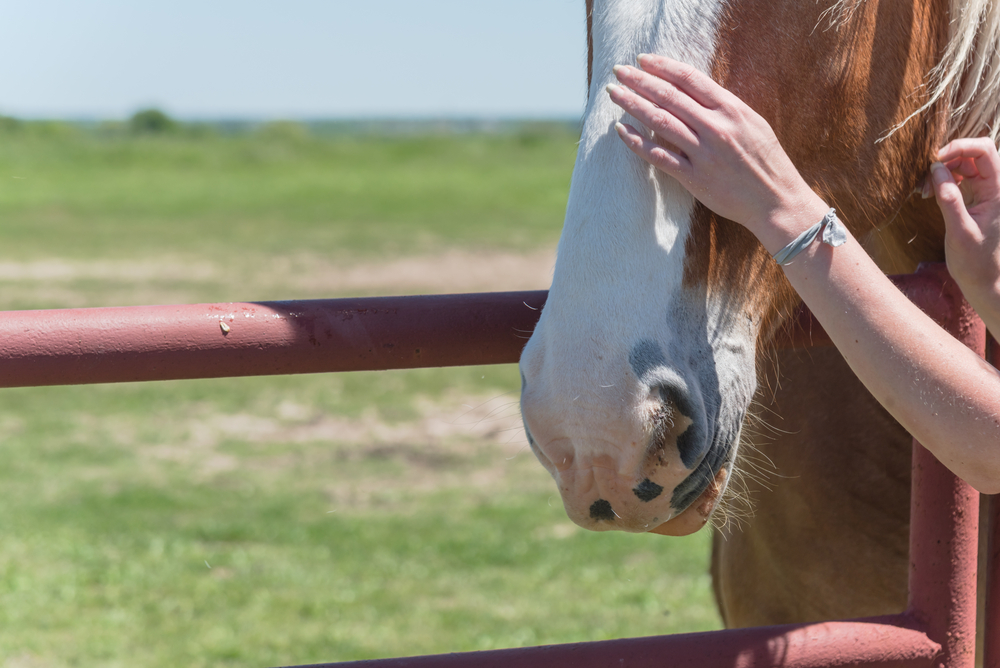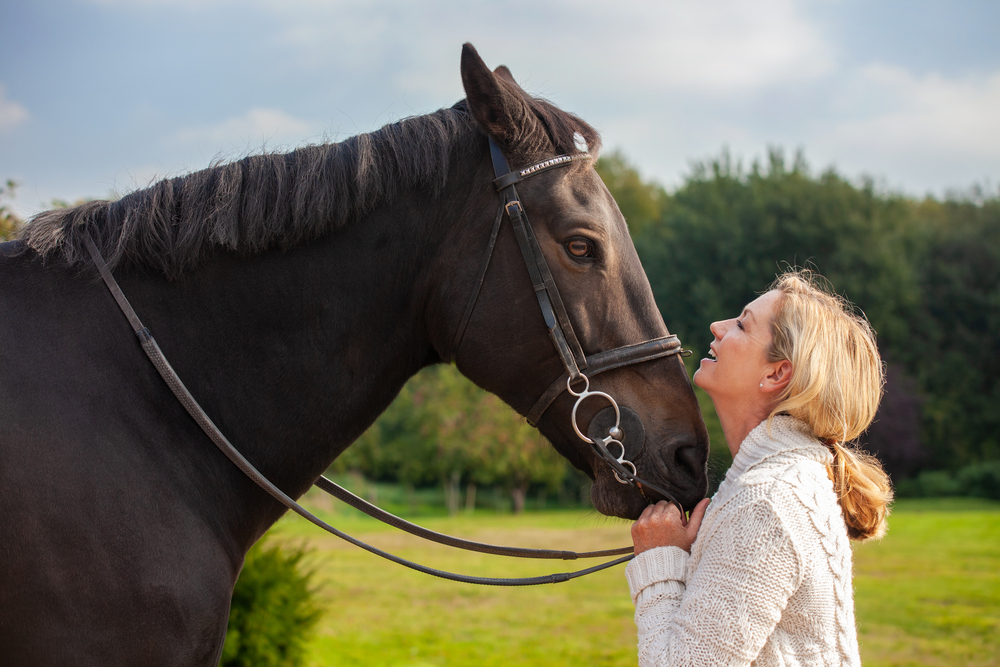 Post-Traumatic Stress Disorder (PTSD) affects countless individuals across the globe, stemming from various traumatic events. Traditional treatments have been effective to an extent, but the quest for innovative and compassionate therapies brings us to the remarkable world of equine therapy for PTSD. This gentle yet powerful approach to animal-assisted therapy offers new hope for those grappling with PTSD, merging the healing presence of horses with therapeutic strategies to foster recovery.
Post-Traumatic Stress Disorder (PTSD) affects countless individuals across the globe, stemming from various traumatic events. Traditional treatments have been effective to an extent, but the quest for innovative and compassionate therapies brings us to the remarkable world of equine therapy for PTSD. This gentle yet powerful approach to animal-assisted therapy offers new hope for those grappling with PTSD, merging the healing presence of horses with therapeutic strategies to foster recovery.
Post-Traumatic Stress Disorder (PTSD) is a complex mental health condition that can emerge after an individual has experienced or witnessed a life-altering traumatic event. These events that cause PTSD can include but are not limited to, military combat, natural disasters, terrorist incidents, serious accidents, or personal assaults. The condition permeates deep into the lives of those affected, influencing their mental, emotional, and physical well-being in profound ways.
The psychological repercussions of PTSD are diverse and can significantly impair an individual’s daily functioning and quality of life. Common symptoms include:
While PTSD is primarily recognized for its psychological effects, it can also manifest in various physical symptoms and conditions, underscoring the intrinsic link between mental and physical health:
The wide-ranging impact of PTSD on both mental and physical health highlights the necessity for comprehensive and multifaceted treatment approaches. While cognitive-behavioral therapy (CBT) and medication serve as fundamental components of PTSD treatment, they may not fully address the breadth of symptoms experienced by all individuals. This gap in treatment efficacy underlines the importance of exploring and validating alternative therapies that can offer holistic benefits. Approaches such as equine therapy, art therapy, mindfulness practices, and physical activities tailored to trauma recovery can play crucial roles in a multidisciplinary treatment plan, offering paths to healing that encompass the totality of an individual’s experience.
 Equine-assisted therapy, a distinctive form of experiential therapy, engages individuals in therapeutic activities with horses under the supervision of a certified equine specialist therapist. This innovative mental and emotional healing approach predates the dynamic and responsive relationships between patients and horses. Unlike traditional talk therapies, equine therapy offers individuals a unique, non-verbal avenue to explore their feelings, behaviors, and thought patterns through direct interaction with these sensitive and intuitive animals.
Equine-assisted therapy, a distinctive form of experiential therapy, engages individuals in therapeutic activities with horses under the supervision of a certified equine specialist therapist. This innovative mental and emotional healing approach predates the dynamic and responsive relationships between patients and horses. Unlike traditional talk therapies, equine therapy offers individuals a unique, non-verbal avenue to explore their feelings, behaviors, and thought patterns through direct interaction with these sensitive and intuitive animals.
The therapeutic use of horses dates back to ancient civilizations when the bond between humans and horses was recognized for its healing potential. However, it was not until the 20th century that equine therapy began to gain formal recognition as a therapeutic modality. The development of equine-assisted therapy, as we know it today, has evolved from its rudimentary beginnings into a sophisticated approach that leverages the natural empathetic connection between humans and horses to facilitate healing and personal growth.
Equine-assisted therapy is grounded in several core principles that distinguish it from other therapeutic approaches:
In recent years, the application of equine-assisted therapy has expanded across a spectrum of mental health issues, including but not limited to PTSD, anxiety, depression, substance abuse, and autism spectrum disorders. The structured yet flexible nature of equine therapy allows it to be tailored to each participant’s specific needs and goals, making it a versatile tool in mental health treatment.
A growing body of research supports the mental health benefits of equine therapy for PTSD, highlighting its effectiveness in improving emotional regulation, reducing symptoms of anxiety and depression, and enhancing overall psychological well-being. Furthermore, the physical aspects of working with horses—such as grooming, leading, and riding—can improve physical and mental health problems and contribute to a holistic sense of wellness.
Post-Traumatic Stress Disorder (PTSD) is a condition that lingers in the minds of those who have experienced or witnessed life-threatening events, leaving them in a perpetual state of fear, anxiety, and distress. Traditional therapy methods have offered hope for many, yet some find themselves searching for alternative pathways to healing. Equine therapy has emerged as a powerful ally in the battle against PTSD, utilizing the unique bond between humans and horses to foster recovery. This innovative approach aids PTSD recovery through several fundamental mechanisms, each contributing to the journey toward mental well-being.
One of the foundational elements of equine therapy is its ability to cultivate trust and confidence within individuals. Traumatic experiences often shatter one’s trust in the world around them, making the path to recovery daunting. With their nonjudgmental presence and sensitivity to human emotions, horses provide a safe space for individuals to begin rebuilding this trust. Learning to communicate and work with a horse requires patience, understanding, and a gentle approach—qualities that are essential in a therapeutic setting.
Forming a bond with a horse teaches individuals about the importance of trust and respect in relationships. As participants learn to interpret the horse’s body language and respond appropriately, they witness the development of mutual trust. This experience is profoundly symbolic, demonstrating that trust in social relationships can be rebuilt and confidence restored, even after the deepest traumas.
Horses are highly attuned to human emotions and can mirror them to their handlers. This unique aspect of equine therapy offers individuals a mirror through which they can observe their emotional state. For those dealing with PTSD, recognizing and regulating emotions is a critical step toward recovery. The horse’s ability to reflect an individual’s feelings enables participants to become more aware of their emotional responses and begin regulating them.
This interaction encourages non-verbal communication and emotional intelligence often lost in the aftermath of trauma. Through the horse’s feedback, individuals learn to calm their anxiety, soothe their fears, and approach situations with a newfound emotional balance. This practice of emotional regulation extends beyond the therapy sessions, equipping individuals with the tools they need to navigate the complexities of their emotions in daily life.
The therapeutic environment provided by equine therapy allows for a profound reflection on one’s emotions and behaviors. Horses react to their handlers’ emotional and behavioral state, offering immediate and honest feedback. This feedback is invaluable as it prompts individuals to reflect on their actions and emotional responses in real-time.
Such reflection is essential for personal growth and understanding. It enables individuals to identify patterns in their behavior that may be contributing to their struggles with PTSD. With the guidance of a skilled therapist, participants can explore these reflections, gaining insights into their emotional and behavioral responses. This understanding paves the way for positive changes, fostering personal development and a deeper comprehension of oneself.
The effectiveness of equine therapy in treating PTSD is not just anecdotal; it is backed by research. Numerous studies have demonstrated significant improvements in PTSD symptoms among participants of equine therapy programs. These improvements include reduced anxiety, lower levels of depression, and a general increase in psychological well-being.
Research in this field continues to grow, offering hope and validation for equine therapy as a legitimate and impactful treatment method for PTSD. As our understanding of the human-animal bond deepens, so too does our ability to harness this connection in the service of healing and recovery.
 Equine therapy offers a unique and powerful approach to healing from PTSD. Individuals are guided toward recovery by building trust and confidence, regulating emotions, and reflecting on emotions and behaviors. Supported by research and embraced by many, equine therapy is a testament to the healing power of the bond between humans and horses, offering hope for those navigating the aftermath of trauma.
Equine therapy offers a unique and powerful approach to healing from PTSD. Individuals are guided toward recovery by building trust and confidence, regulating emotions, and reflecting on emotions and behaviors. Supported by research and embraced by many, equine therapy is a testament to the healing power of the bond between humans and horses, offering hope for those navigating the aftermath of trauma.
At Transformations Mending Fences, we pride ourselves on our top-rated equine therapy program. Our approach combines the natural healing power of horse interactions with expert therapeutic guidance, offering a unique pathway to recovery. Testimonials from our clients highlight profound personal transformations, underscoring the impact of our program.
Our equine therapy program is part of a comprehensive treatment model that includes a variety of therapeutic modalities. We understand that recovery is a highly personal journey, so we tailor each treatment plan to the individual’s needs, ensuring the most effective path to healing.
Embarking on mental health treatment with equine therapy at Transformations Mending Fences involves a simple process. From the initial consultation to outlining a personalized treatment plan, our team is here to support you every step of the way. We encourage anyone struggling with PTSD to consider the profound benefits of equine therapy.
Equine therapy represents a powerful tool in the treatment of PTSD, offering a compassionate, innovative approach to healing. At Transformations Mending Fences, we’re committed to providing this life-changing therapy as part of our mission to support mental health and recovery.
If you or someone you know could benefit from equine therapy for PTSD, contact Transformations Mending Fences today at (888) 995-6013 to learn more about our program or to schedule a visit. Let us help you on your journey to recovery.
Mental Illness Policy
https://mentalillnesspolicy.org/consequences/percentage-mentally-ill-untreated.html
Mental Health and Learning Disabilities Research and Practice
https://search.informit.org/doi/abs/10.3316/informit.673289488260385
Journal of Traumatic Stress
https://onlinelibrary.wiley.com/doi/abs/10.1002/jts.21990
U.S. Department of Veterans Affairs
https://www.ptsd.va.gov/professional/treat/cooccurring/index.asp
Human Brain Mapping